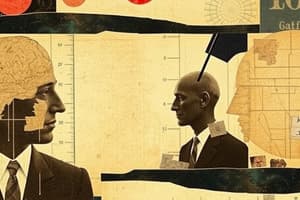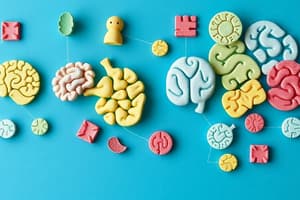Podcast
Questions and Answers
Which of the following individuals is most closely associated with naturalist intelligence?
Which of the following individuals is most closely associated with naturalist intelligence?
- Charles Darwin (correct)
- Pablo Picasso
- Frank Loyd Wright
- Bill Clinton
Which region of the brain is hypothesized to be associated with spiritual intelligence?
Which region of the brain is hypothesized to be associated with spiritual intelligence?
- Left parietal lobe
- Right temporal lobe (correct)
- Right parietal lobe
- Frontal lobes
What characterizes interpersonal intelligence?
What characterizes interpersonal intelligence?
- Recognizing and categorizing patterns in nature
- Pondering questions about existence
- Understanding oneself and one's emotions
- Understanding people and relationships (correct)
Which of the following is NOT an example of a criterion for considering an intelligence?
Which of the following is NOT an example of a criterion for considering an intelligence?
Which of the following individuals is cited as an example of intrapersonal intelligence?
Which of the following individuals is cited as an example of intrapersonal intelligence?
Which intelligence is primarily linked to understanding and classifying living and non-living entities?
Which intelligence is primarily linked to understanding and classifying living and non-living entities?
Damage to which area of the brain would most likely impair language production?
Damage to which area of the brain would most likely impair language production?
Which pair of individuals is most closely associated with interpersonal intelligence?
Which pair of individuals is most closely associated with interpersonal intelligence?
Which type of intelligence involves sensitivity to meaning and order of words?
Which type of intelligence involves sensitivity to meaning and order of words?
Which intelligence is characterized by the ability to reason logically and recognize patterns?
Which intelligence is characterized by the ability to reason logically and recognize patterns?
What type of intelligence includes sensitivity to pitch, melody, rhythm, and tone?
What type of intelligence includes sensitivity to pitch, melody, rhythm, and tone?
Which intelligence is exemplified by individuals who excel in physical movements and coordination?
Which intelligence is exemplified by individuals who excel in physical movements and coordination?
Spatial intelligence is primarily about which ability?
Spatial intelligence is primarily about which ability?
Which of these intelligences is related to the ability to understand and interact with others?
Which of these intelligences is related to the ability to understand and interact with others?
Which intelligence would be exemplified by someone skilled in gardening or understanding ecosystems?
Which intelligence would be exemplified by someone skilled in gardening or understanding ecosystems?
What is the primary focus of intrapersonal intelligence?
What is the primary focus of intrapersonal intelligence?
What does each intelligence need to have according to the defined characteristics?
What does each intelligence need to have according to the defined characteristics?
What does the existence of savants and prodigies demonstrate about intelligence?
What does the existence of savants and prodigies demonstrate about intelligence?
In a Multiple Intelligences classroom, what is prioritized over traditional methods?
In a Multiple Intelligences classroom, what is prioritized over traditional methods?
How does the support from experimental psychological tasks contribute to understanding intelligence?
How does the support from experimental psychological tasks contribute to understanding intelligence?
What characteristic distinguishes the developmental progression of an intelligence?
What characteristic distinguishes the developmental progression of an intelligence?
What kind of encoding system is associated with each intelligence?
What kind of encoding system is associated with each intelligence?
In a traditional classroom, how are students with strong scholastic intelligence viewed?
In a traditional classroom, how are students with strong scholastic intelligence viewed?
What role do teachers play in a Multiple Intelligences classroom?
What role do teachers play in a Multiple Intelligences classroom?
Flashcards are hidden until you start studying
Study Notes
Howard Gardner's Theory of Multiple Intelligences
- Gardner's Theory of Multiple Intelligences (MI) suggests 8 human intelligence modalities.
- The theory was proposed by American Psychologist Howard Gardner.
- Gardner believes "Everybody is a genius. But if you judge a fish by its ability to climb a tree, it will live its whole life believing that it is stupid."
8 Criteria for Considering an Intelligence
- There should be evidence of potential isolation by brain damage.
- For example, damage to Broca's area hinders language production.
- An intelligence should have an evolutionary history and plausibility.
- Evidence of antecedents should be identifiable in other species with a plausible evolutionary explanation of how it may have been selected.
- An intelligence should have one or more core operations that deal with a particular type of input, like language or music.
- An intelligence should have a distinctive development progression with a definable end-state.
- Evidence of an expert level should be recognizable.
- An intelligence should be reflected by exceptionalities and savants, those with a single exceptional talent, or prodigies, who demonstrate remarkable abilities in a small number of areas.
- An intelligence should be supported by experimental psychological tasks (like reasoning, language, and spatial cognition).
- An intelligence should be supported by psychometric findings, especially those that assess linguistic and logical/mathematical capabilities.
Linguistic Intelligence
- Sensitivity to meaning and order of words
- Facility with words and languages
- People who exemplify this intelligence include:
- Maya Angelou (Poet)
- Stephen King (Writer)
- Martin Luther King (Civil Rights Leader and Orator)
- Located in the left hemisphere, temporal lobe.
Logical-Mathematical Intelligence
- Ability to reason logically and recognize patterns and order.
- The ability to reason logically, solve problems, and think abstractly.
- People who exemplify this intelligence include:
- Bill Gates (Former CEO of Microsoft)
- Stephen Hawking (Physicist)
- James Watson (Biologist)
- Located in the left parietal lobe for verbal naming and right hemisphere for spatial organization.
Musical Intelligence
- Sensitivity to pitch, melody, rhythm, and tone.
- The ability to perceive, create, and appreciate music.
- People who exemplify this intelligence include:
- Yo Yo Ma (Cellist)
- Mariah Carey (Singer)
- Wolfgang Amadeus Mozart (Composer)
- Located in the right anterior temporal lobe and frontal lobes.
Bodily-Kinesthetic Intelligence
- Ability to use one's body skillfully and handle objects adroitly.
- The ability to use one's body skillfully and to control physical movements.
- People who exemplify this intelligence include:
- David Copperfield (Magician)
- Kobe Bryant (Basketball Player)
- Mia Hamm (Soccer Player)
- Located in the cerebral motor strip, thalamus basal ganglia, cerebellum.
Spatial Intelligence
- Ability to perceive the physical environment accurately and to recreate aspects of the environment.
- The ability to perceive and manipulate visual information.
- People who exemplify this intelligence include:
- Frank Lloyd Wright (Architect)
- Pablo Picasso (Painter)
- Georgia O'Keeffe (Painter)
- Located in the right hemisphere, parietal occipital lobe.
Naturalist Intelligence
- Ability to recognize and classify numerous species of flora and fauna.
- The ability to recognize and categorize patterns in nature.
- People who exemplify this intelligence include:
- Charles Darwin (Biologist)
- Jane Goodall (Primatologist)
- E.O Wilson (Biologist)
- Located in the left parietal lobe for discriminating living from nonliving.
Interpersonal Intelligence
- Ability to understand people and relationships.
- The ability to understand and interact effectively with others.
- People who exemplify this intelligence include:
- Bill Clinton (Politician)
- Ronald Reagan (Politician)
- Madeline Albright (Diplomat)
- Located in the frontal lobes.
Intrapersonal Intelligence
- Access to one's emotional life as a means to understand oneself and others.
- The ability to understand oneself, including one's emotions, thoughts, and motivations.
- People who exemplify this intelligence include:
- Oprah Winfrey (Talk Show Host)
- Bono (Singer, Philanthropist)
- Located in the frontal lobes.
Spiritual Intelligence
- Individuals who exhibit a proclivity to pose and ponder questions about life, death, and ultimate realities.
- People who exemplify this intelligence include:
- Albert Einstein (Scientist)
- Socrates (Philosopher)
- Dalai Lama (Tibetan Monk)
- Hypothesized as specific region in the right temporal lobe.
Traditional vs. Multiple Intelligences Classrooms
- Traditional classrooms focus on scholastic intelligence, creating a hierarchy of intellect, and emphasize acquiring information and facts.
- Multiple Intelligences (MI) classrooms are tailored to the variety of human intelligences by using all students' intelligences to help them learn.
- Teachers value personal intelligences, emphasizing that "Who you are is more important than what you know."
- Students learn in a constructivist way, creating meaning, and the classroom is child-centered.
Studying That Suits You
Use AI to generate personalized quizzes and flashcards to suit your learning preferences.




